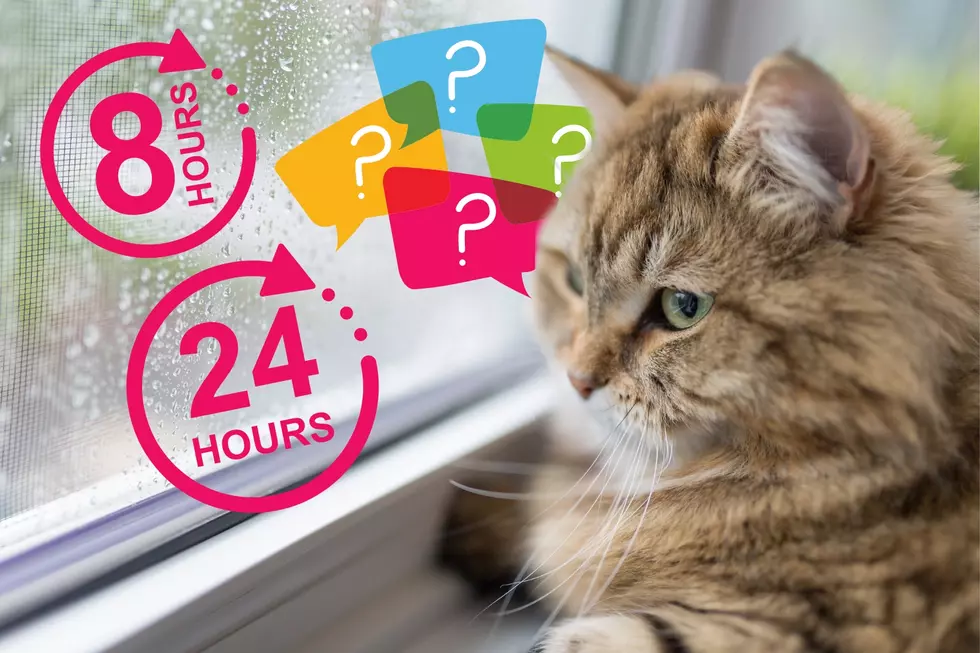
How Long Can You Leave Your Cat Home Alone?
In a conversation with a co-worker about pet ownership, we touched on the usual hurdles like vacations. He remarked, "I wish I had a cat — you can leave them alone longer than a dog."
That got me thinking...
How Long Can You Leave a Cat Home Alone?
Some dog owners grapple with their pooch's separation anxiety, a real nightmare where even stepping out the door can trigger Fido to bark non-stop or chew a hole in the drywall (trust me, I've been there).
READ MORE: What’s With Cats and Boxes? And Answers to 49 Other Kitty Questions
However, I've always thought (as a dog dad) that one of the perks of owning a cat is their independent nature and somewhat relaxed attitude toward your absence. But just how long is too long?
Your Cat Doesn't Need You to Work From Home
Experts generally agree on the length of time a cat should be left at home alone, though there might be some variations in the specifics.
Pet food company Purina has a section on their website that discusses this very thing. They suggest that most cats (emphasis on most) are totally cool chilling solo for about 8 hours — say, an average work day. As long as they have fresh water, they may even be able to handle 24 hours.
READ MORE: South Carolina Police Officer Adopts Sweet Kitten Found In Trash
I found that last bit a little strange since it doesn't mention feeding Fluffy more than once during a 24-hour period, but the College of Veterinary Medicine at Cornell University says that an average adult cat can be fed once or twice a day, so I guess that checks out if it's once in a while.
Reader's Digest, the go-to for fun facts, dives deep into the cat conundrum. According to their research, cats can handle being left alone for 24-48 hours, given they've got water, food, and a pristine litter box. Now we're getting somewhere.
Is Your Kitty a New Addition to Your Family?
But as usual, this is where the variables come in. For example, when did you adopt them? Michael Thompson, DVM told Reader's Digest that a newly adopted kitty — regardless of age — needs time to get used to its surroundings and its people before they are left alone for 24 hours.
Age Makes a Difference
Kittens are a whole different beast with different needs and are full of curiosity and energy. Dr. Thompson recommends being a little more conservative with alone time for the itty bitty kitties: “Kittens have higher energy levels and need more social interaction and playtime. Ideally, they should be left unsupervised for, at most, four to six hours,”
DOGS TOO: Ranking the 63 Smartest Dog Breeds
Every Cat Is Different
There are lots of other things to consider when setting up your cat separation strategy.
Do they have any physical or behavioral challenges? You'll want to make sure that the home is free of obstacles that may result in any accidents. Home security cameras come in a variety of price ranges that will allow you to monitor your kitty and rush home or make a call if issues arise.
READ MORE: See the Pets Banned in Each State
How often are they left home alone? If this is new territory, consider doing some trial runs to gauge their comfort level before committing to longer absences. Testing the waters first might save you both some stress in the long run.
Or Just Phone a Friend
If leaving your furball solo feels like playing cat and mouse with disaster, no worries. You can always call in a pal or a purr-fessional sitter to cat-sit while you're off on your own adventure. Think about it: some folks would claw their way for a chance to hang out with a cuddly kitty that's just itching to shower them with affection.
Why do cats have whiskers? Why do they meow? Why do they nap so much? And answers to 47 other kitty questions:
Gallery Credit: Andrew Lisa
RANKED: Here Are the 63 Smartest Dog Breeds
Gallery Credit: Sabienna Bowman



